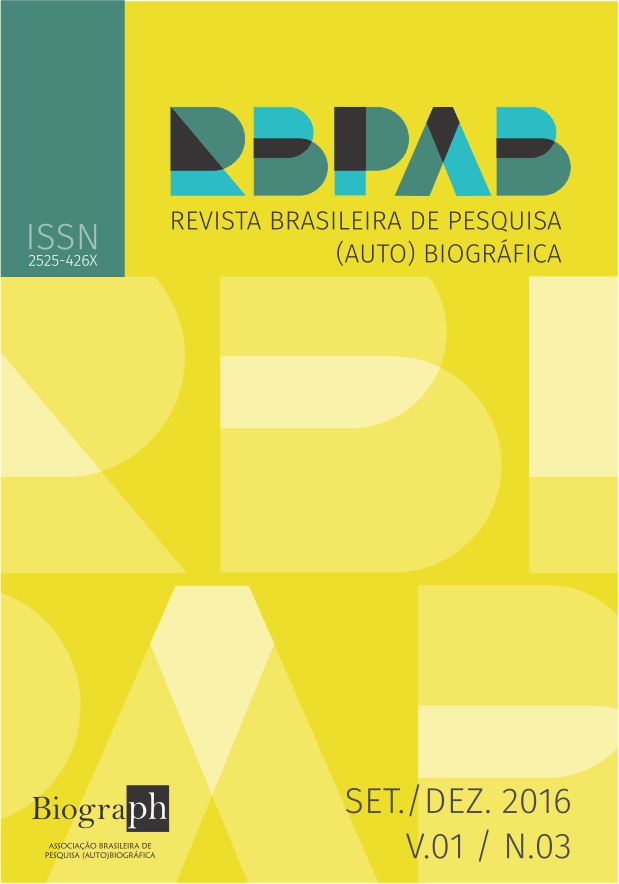INTRODUZINDO A INVESTIGAÇÃO NARRATIVA NOS CONTEXTOS DE NOSSAS VIDAS: UMA CONVERSA SOBRE NOSSO TRABALHO COMO INVESTIGADORES NARRATIVOS
DOI:
https://doi.org/10.31892/rbpab2525-426X.2016.v1.n3.p565-583Palabras clave:
Investigação narrativa, Experiências de investigação, Conversa sobre pesquisa, Ética relacionalResumen
O texto relata nossas experiências como investigadores narrativos para destacar aspectos da investigação narrativa que, frequentemente, criam dificuldades para novos pesquisadores a esta forma relacional de pesquisa. A investigação narrativa é o estudo da experiência entendida narrativamente. Dessa forma, chamamos a atenção para a investigação narrativa como um fenômeno sob estudo e metodologia para o estudo. Isso por si só, frequentemente, cria confusão para aqueles que são novos na investigação narrativa. Destacamos três tensões particulares que, frequentemente, causam dificuldades para os pesquisadores. Engajando no início da narrativa autobiográfica, mudando de textos de campo para textos de pesquisa e conduzindo investigações narrativas tornadas propositais para justificativas pessoais, teóricas/práticas e sociais foram as três tensões que selecionamos. Baseando em investigações narrativas contínuas e recentemente concluídas, Dilma, Shaun e Jean tornaram explícitas as maneiras como mudaram de textos de campo provisórios para textos finais de pesquisa.
Descargas
Citas
AJAYI, L. Investigating effective teaching methods for a place-based teacher preparation in a rural community. Educational Research for Policy and Practice, 13 (3), p. 251-268, 2014.
AZANO, A. The possibility of place: One teacher’s use of place-based instruction for English students in a rural high school. Journal of Research in Rural Education, 26 (10), p. 26-10, 2011.
BROOK, J. Placing elementary music education: a case study of a Canadian rural music program. Music Education Research, 15 (3), p. 290-303, 2013.
CLANDININ, D. J. Engaging in narrative inquiry. Walnut Creek, CA: Left Coast Press, Inc, 2013.
CLANDININ, D. J. & CONNELLY, F. M. Narrative inquiry: experience and story in qualitative research. San Francisco, Calif.: Jossey-Bass, 2000.
CLANDININ, D. J. & CONNELLY, F. M. Teachers' professional knowledge landscapes. New York: Teachers College Press, 1995.
CLANDININ, D. J., & CONNELLY, F. M. Teacher as curriculum maker. In P. W. Jackson (Ed.), Handbook of research on curriculum New York: Macmillan, 1992. p. 363-401.
CLANDININ, D. J., & CAINE, V. Narrative Inquiry. In. TRAINOR, A. A. & GRAUE, E. (Eds.), Reviewing qualitative research in the social sciences. London: Routledge, 2013. p. 166-179.
CLANDININ, D. J., CAINE, V., & STEEVES, P. Composing lives in transition. London: Emerald Press, 2013.
CLANDININ, D. J., MURPHY, M. S., HUBER, J., & MURRAY-ORR, A. Negotiating narrative inquiries: Living in a tension-filled midst. The Journal of Educational Research, 103, p. 81–90, 2010.
CLANDININ, D. J.; HUBER, J.; HUBER, M.; MURPHY, M. S.; MURRAY-ORR, A.; PEARCE, M.; & STEEVES, P. Composing diverse identities: Narrative inquiries into the interwoven lives of children and teachers. London: Routledge, 2006.
CLANDININ, D.J. & ROSIEK, J. Mapping a landscape of narrative inquiry: Borderland spaces and tensions. In. CLANDININ, D. J. (Ed.). Handbook of narrative inquiry: mapping methodology. Thousand Oaks, CA: Sage Publications, 2007. p. 35-75.
CONNELLY, F. M., & CLANDININ, D. J. Narrative Inquiry. In GREEN, J.; CAMILLI, G. & ELMORE, P. (Eds.). Handbook of complementary methods in education research. Mahwah, NJ: Lawrence Erlbaum, 2006. p. 477-487.
CONNELLY, F. M., & CLANDININ, D. J. (1999). Shaping a professional identity: Stories of educational practice. New York: Teachers College Press, 1999.
CONNELLY, F. M., & CLANDININ, D. J. Teachers as curriculum planners: narratives of experience. New York, NY: Teachers College Press, 1988.
DEWEY, J. Experience and education. New York: Simon and Schuster Inc, 1938.
DEWEY, J. Experience and education. New York: Touchstone [1938], 1997.
GRUENEWALD, D. A., & SMITH, G. A. Place-based education in the global age: Local diversity: London: Routledge, 2014.
HUBER, J., MURPHY, M. S., & CLANDININ, D. J. Places of Curriculum Making: Narrative Inquiries Into Children's Lives in Motion. New York: Emerald Group Pub Limited. 2011.
LUGONES, M. Playfulness, World Traveling and Loving Perceptions. Hypatia, 2 (2), p. 3-19, 1987.
MURPHY, M. S., HUBER, J., & CLANDININ, D. J. Narrative Inquiry Into Two Worlds of Curriculum Making. Learning Landscapes, 5, p. 219-236, 2012.
SCHWAB, J. J. The Practical: Translation into Curriculum. In WESTBURY, I. & WILKOF, N. J. (Eds.), Science, curriculum, and liberal education: Selected essays. Chicago: University of Chicago Press. 1978. p. 365-383.
SMYTH, J.; HATTAM, R.; WITH CANNON, J., EDWARDS, J., WILSON, N. & WURST, S. Dropping out, drifting off, being excluded: Becoming somebody without school. New York: Peter Lang Publishing, 2004.
WAITE, S. ‘Knowing your place in the world’: how place and culture support and obstruct educational aims. Cambridge Journal of Education, 43 (4), p. 413-433, 2013.
WENGER, E. Communities of Practcies: Learning, Meaning and Identity. Cambridge University Press, 1998.













































